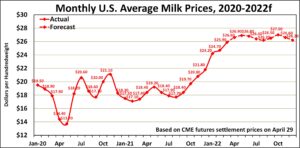Michigan dairy farmer Ashley Kennedy, a member of the Michigan Milk Producers Association, testified on behalf of MMPA and the National Milk Producers Federation at the Senate Agriculture Committee’s first hearing dedicated to the upcoming Farm Bill, the twice-a-decade reauthorization of all USDA programs.
“I couldn’t have come back to the family farm if it were not for many of these programs,” said Kennedy, whose family milks 240 cows in east-central Michigan, at the field hearing held April 29 at Michigan State University in East Lansing. “Being a part of the conversation is essential to see a future that reflects opportunity and success.”
Addressing Senate Agriculture Committee Chairwoman Debbie Stabenow (D-MI), who presided over the hearing, Kennedy discussed her perspective as a third-generation farmer on the successes and shortcomings of current dairy policies and programs Congress must address in the next reauthorization. Kennedy thanked the committee, and Chairwoman Stabenow in particular, for overhauling the dairy safety net during the last farm bill and providing producers with access to crop insurance-like risk management tools, which puts dairy farmers on par with producers of other commodities.
Kennedy praised the Dairy Margin Coverage program as “essential to our farm and family’s financial success last year” and called attention to recent improvements that accounted for modest production increases and better reflect dairy farmer feed costs.
Still, the lessons of the COVID-19 pandemic for the dairy sector in Michigan and nationwide need to be considered, Kennedy said in her written testimony, including the effects of a milk pricing change made in the previous farm bill. “The combined effects of the change made to the Class I mover in the last farm bill, and the government’s heavy cheese purchases, cost dairy farmers over $750 million in Class I skim revenue ring the last six months of 2020.”
The dairy industry, under NMPF leadership, is seeking consensus on a range of improvements to the Federal Milk Marketing Order system, including but not limited to the Class I mover, that can be taken to the U.S. Department of Agriculture for consideration in a national order hearing.
Beyond economic policy, Kennedy also advocated for additional investments in conservation programs to help dairy farmers build on their ongoing sustainability work; urged a doubling of funding for key trade promotion programs; and spoke to the importance of farm bill nutrition programs as “the bedrock of linking the food we produce as farmers to households across the country.”
Kennedy closed by offering a personal take on the need for significant mental health policy in the farm bill. “Stress in rural America is not talked about enough, which is unfortunate, because it’s a problem we can only solve by working together.” Kennedy thanked the committee for reauthorizing the Farm and Ranch Stress Assistance Network in the last farm bill but urged that even more robust resources be provided.
The Senate Agriculture Committee is expected to hold an additional field hearing in Arkansas, the home state of Ranking Republican John Boozman, in the coming weeks.







